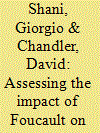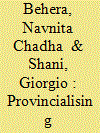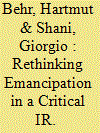|
|
|
Sort Order |
|
|
|
Items / Page
|
|
|
|
|
|
|
| Srl | Item |
| 1 |
ID:
096555


|
|
|
| 2 |
ID:
187532


|
|
|
|
|
| Summary/Abstract |
This article will attempt to ‘provincialise’ (Chakrabarty, 2000) the ‘secular cosmology’ of International Relations (IR) through an examination of the relational cosmology of dharma. We argue that IR is grounded in ‘secularised’ Judaeo-Christian assumptions concerning time, relations between self and other, order, and the sovereign state that set the epistemic limits of the discipline. These assumptions will be ‘provincialised’ through an engagement with dharma based on a reading of The Mahābharāta, one of the oldest recorded texts in the world. We argue that the concept of dharma offers a mode of understanding the multidimensionality of human existence without negating any of its varied, contradictory expressions. By deconstructing notions of self and other, dharma illustrates how all beings are related to one another in a moral, social, and cosmic order premised on human agency, which flows from ‘inside-out’ rather than ‘outside-in’ and that is governed by a heterogenous understanding of time. This order places limits on the state's exercise of power in a given territory by making the state responsible for creating social conditions that would enable all beings to realise their potential, thus qualifying the principle of state sovereignty that remains the foundation of the ‘secular cosmology of IR’.
|
|
|
|
|
|
|
|
|
|
|
|
|
|
|
|
| 3 |
ID:
182444


|
|
|
|
|
| Summary/Abstract |
This article seeks to reconceptualise emancipation in critically theorising International Relations (IR) by developing ‘thin’ and ‘thick’ versions of normativity and applying them as conditions for a pluriversal dialogue between different cosmologies. We start with the premise that ‘critical IR’ is both Eurocentric and a-normative, and argue that a normative engagement with critical discourses both inside and outside the West is necessary to recapture its emancipatory promise. Drawing on the work of Max Horkheimer, Herbert Marcuse and Jacques Derrida, we develop ‘thin’ and ‘thick’ versions of normativity. The former, we argue, operates as a critical corrective of thick normative positions, reclaiming their openness to difference, while not making substantive moral or political claims itself. We then apply these version of normativity to examine the possibility of a global pluriversal dialogue between different cosmologies. Cosmologies, we argue, refer to sets of ontological and epistemological claims about the human condition that are inherently normative. ‘Thin’ normativity applied to the ‘thick’ claims of cosmologies prevents the essentialisation and hierarchisation of cosmological difference(s) by revealing and de-constructing the latter’s potentially discriminatory, exclusionary, and violent tendencies. In so doing, it facilitates a global inter-cosmological dialogue which we regard as the objective of a post-western, critical IR.
|
|
|
|
|
|
|
|
|
|
|
|
|
|
|
|
| 4 |
ID:
085576


|
|
|
|
|
| Publication |
2008.
|
| Summary/Abstract |
This article explores the possibilities of the emergence of a genuinely "post-Western," and less Eurocentric, "critical" international relations (IR) theory through a brief examination of "critical" discourses within two "non-western" cosmopolitan traditions: Islam and Sikhism. It is argued that, although critical IR has created space for the articulation of post-western discourses within the discipline, it continues to speak for and to the West. A genuinely "post-western" critical IR would seek to go beyond mere mimicry of the "derivative discourses" of the modern West by identifying critical discourses on the political from within non-western traditions.
|
|
|
|
|
|
|
|
|
|
|
|
|
|
|
|
|
|
|
|
|